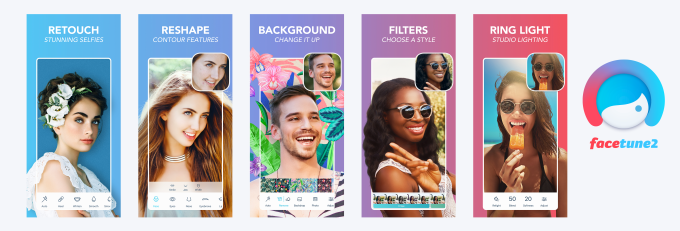Facetune developer Lightricks, which operates over a dozen subscription-based photo and video editing apps across iOS and Android, now has $130 million in new funding to further grow its business. The company’s newly announced Series D round includes $100 million in primary and $30 million in secondary funding, and now values the company at $1.8 billion. To date, Lightricks has raised $335 million.
The new round was co-led by New York-based VC firm Insight Partners and Hanaco Venture Capital and includes new investors Migdal Insurance, Altshuler Shaham, and Shavit Capital. Existing investors Goldman Sachs Asset Management, Clal Tech, Harel Insurance and Finance, and Greycroft, also participated.
The company’s last round of funding was its pre-pandemic raise of $135 million, which minted the company as a unicorn.
Based in Jerusalem, Lightricks has been best known for its photo-editing app Facetune, which puts Photoshop-like retouching tools into the hands of consumers. The app quickly gained traction as online influencers tweaked their Instagram photos to look more polished, perfected, and blemish-free. This growth wasn’t without controversy, however, as some argued how image editing apps like Facetune took airbrushing too far, contributing to body image issues that now, Facebook’s internal research indicates, could have a negative effect on teenagers’ mental health.
But Facetune was only the beginning for what’s since become a mobile editing empire for Lightricks, at a time when everyone is trying to look their best online and create compelling content. Over the years, the company has rolled out the more powerful Facetune 2, along with other creativity and mobile photo apps that weren’t focused on selfies. It also expanded its product lineup beyond the creator crowd to bring a suite of tools to online marketers and small businesses. And last year, Lightricks more directly responded to the growth in online video as a form of self-expression with a new selfie retouching tool called Facetune Video — essentially the Facetune for the TikTok era.

Image Credits: Lightricks
The company benefitted from Covid-19 lockdowns, as well, as more people participated online and creators, as a group, became more well-established as a way for brands to reach consumers. During peak lockdowns, the company saw a 90% increase in usage across its apps in the U.S. Meanwhile, downloads for its popular Videoleap video editing apps jumped 70% since the start of the pandemic, as TikTok adoption also grew.
Across its suite of apps, the company now touts 29 million monthly active users, where over 5 million are paid subscribers. Its users average around 78 million monthly exports, indicating Lightricks’ sizable impact on the creator economy. In 2021, Lightricks is on track for over $200 million in revenue and plans to grow that figure by 40% in the year ahead.
To do so, the company’s strategy will change. Instead of just developing its own apps, it’s now on the hunt for potential acquisitions.
“Our plan is to grow into a one-stop-shop creator platform, supporting creators throughout their journey, from content creation to monetization,” says Zeev Farbman, CEO and Co-Founder of Lightricks. “To do so, we are broadening our acquisition activity, while developing other services in-house—our overall M&A objective is advancing our shift into the creator’s platform. To begin, we are planning between three to five acquisitions, each with a budget of tens of millions of dollars. However, we are also on the lookout for larger ticket size deals if there is enough conviction on both sides,” he notes.

Image Credits: Lightricks
The company will also enhance its own technology to develop tools and services that will help all creators with content production and monetization, and it will grow its team.
Currently, Lightricks has 460 employees and plans to add 60 more by the end of 2021. The longer-term goal is to grow the team to 1,000 employees by the end of 2023, across roles that include developers, designers, and marketing. While most of this growth to date has taken place in Jerusalem, over the next two years, the company plans to grow its teams locally in Haifa, as well as internationally in London and Shenzhen. It may add on other locations through M&As, as well.
The U.K. office is now the largest outside of Lightricks’ headquarters, with 23 people. This number is expected to climb to 35 by year-end and be closer to 50 or 60 by the end of 2022, with growth focused on the production of the company’s new photography app plus Customer Experience and Marketing teams, which were previously only in Israel.
In the U.S., Lightricks is focused on content.
“Our U.S.-based activity will focus mostly on our content efforts that will provide a vast array of original, acquired, and co-produced content to inspire, educate and entertain creators across the entirety of their careers,” notes Farbman. “This includes written, video, audio, short and long-form, fun and informative content,” he says.
Investors say they see the potential for Lightricks to continue to grow as the creator economy booms.
“The creator economy has changed the way we, as a society, experience social networks,” said Pasha Romanovski, Co-Founding Partner of Hanaco Ventures, in a statement. “Audiences constantly consume information through the different content channels daily. Lightricks’ platform enables creators to have a broader, more professional, and higher-quality set of tools to optimize content. At a time when we are seeing content creators monetize content on social media at new levels, it is clear that Lightricks’ platform has the ability to create a one-stop shop that will be meaningful to its users,” he added.
